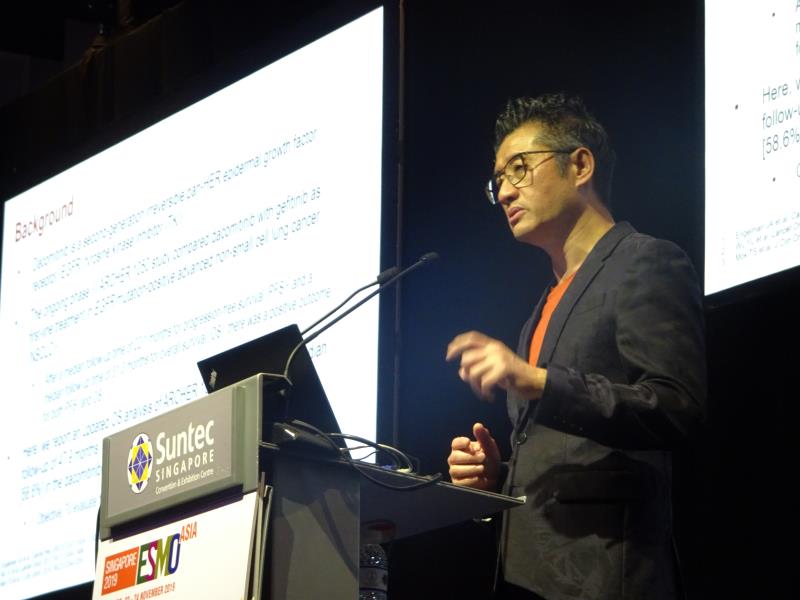 Prof Tony Mok
Prof Tony MokFirst-line treatment with the epidermal growth factor receptor tyrosine kinase inhibitor (EGFR TKI) dacomitinib demonstrated persistent survival benefit in patients with EGFR-positive advanced non-small cell lung cancer (NSCLC), according to updated results from the phase III ARCHER 1050* trial.
The study population of 452 patients with advanced EGFR+ NSCLC with no central nervous system metastases and ECOG status of 0–1 who had not received prior systemic treatment for their condition were randomized 1:1 to receive oral doses of dacomitinib (45 mg QD) or gefitinib (250 mg QD).
At a median 47.9 months, a total of 285 deaths had occurred, 133 and 152 in the dacomitinib and gefitinib treatment arms, respectively.
In this updated analysis, overall survival (OS) was longer in patients who received dacomitinib compared with those who received gefitinib (median 34.1 vs 27.0 months; hazard ratio [HR], 0.748, 95 percent confidence interval [CI], 0.591–0.947; p=0.0155), with OS rates of 41.0 and 33.6 percent with dacomitinib and gefitinib, respectively, at 42 months. [ESMO Asia 2019, abstract LBA19]
Subgroup analysis showed that OS favoured the dacomitinib over the gefitinib arm regardless of sex (pinteraction=0.4902), age (<65 vs ≥65 years; pinteraction=0.0908), ECOG status at baseline (pinteraction=0.1338), race (Asian vs non-Asian; pinteraction=0.9886), smoking status (pinteraction=0.6948), and type of EGFR mutation (exon 19 deletion or L858R ± T790M; pinteraction=0.3292).
The OS improvement with dacomitinib vs gefitinib was demonstrated in the subgroup of Asian patients (median 37.7 vs 29.1 months; HR, 0.759, 95 percent CI, 0.578–0.996; p=0.0457), with a 45.1 percent OS rate with dacomitinib vs 36.8 percent with gefitinib at 42 months.
The numbers were better in the Asian than in the general population in both treatment arms, pointed out Professor Tony Mok from the Chinese University of Hong Kong, China, who presented the results at ESMO Asia 2019.
Reduction in dacomitinib dose did not appear to affect the OS benefit, with a median of 20.7 and 36.7 months, and not reached in patients who received 45 mg, 45 mg reduced to 30 mg, and 45 mg reduced to 15 mg, respectively. This was comparable in the subgroup of Asian patients with a median of 22.0 and 37.7 months, and not reached with those respective dose reductions.
However, Mok noted that these dose-reduction effects were observational and not representative of a cause and effect. The improved OS noted with the reduced dose applied to patients who received the drug for a longer period and required dose reductions. As such, the dose reduction was not responsible for the improved survival, he said.
The OS improvement with dacomitinib vs gefitinib was evident in patients with either EGFR exon 21 L858R (median 32.5 vs 23.2 months; HR, 0.665; p=0.0203) or with EGFR exon 19 deletion (median 36.7 vs 30.8 months; HR, 0.847; p=0.3021), though the results were only significant in the former.
These updated results follow previously released results of the trial, after a median follow-up of 31.3 months, which showed a longer OS with dacomitinib vs gefitinib (median 34.1 vs 26.8 months; HR, 0.760, 95 percent CI, 0.582–0.993; p=0.044). [J Clin Oncol 2018;36:2244-2250]
“With extended follow-up, this updated analysis confirmed previous results demonstrating improvement of OS with dacomitinib vs gefitinib as first-line treatment of patients with EGFR+ advanced NSCLC … with a notable improvement of OS in the Asian population,” said Mok.
“The overall benefit of OS is also applicable to patients who had a dose reduction,” he added.